[click on blue links for further information]
NOTE: All translations of Lao Tzu are from Ursula Le Guin or Witter Bynner unless otherwise noted.
You might say that I’ve been a mess of emotions since the November election. The candidate that I least wanted to win won. To be honest, Donald Trump was next to the last on my list. “Lyin’ Ted was my absolute last choice. I have been venting on social media, with emails to friends and family, and to anyone who pretends to listen on the street or at the store or in a restaurant. That is to say, I’ve been a helpless, foolish, bore.
Why helpless? Because, I know better but I rant anyway. Why foolish? Because it’s a waste of time kvetching with friends and an ineffective means of convincing those with differing opinions. Why a bore? Because that’s what my family tells me.
At the mid-point of the path through life,
I found Myself lost in a wood so dark, the way
Ahead was blotted out.
The keening sound I still make shows how hard it is to say
How harsh and bitter that place felt to me—
Merely to think of it renews the fear—
So bad that death by only a degree
Could possibly be worse.
Dante Alighieri The Divine Comedy, Dante Alighieri, Clive James translation (p. 3).
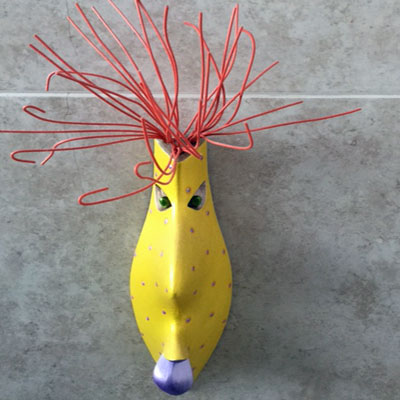
Trompudo
Oh yes, I was lost in a dark wood. But, I found my way out. With the help of [let’s just call him] a friend who voted for this man I detest, this Trompudo, I emerged from the funk. The [friend] based his reasoning on the philosophy of Lao Tzu. How odd was my first thought. For those who do not know, it is said that a Chinese man named Lao Tzu wrote The Way of Life (Tao Te Ching), a set of 81 short verses that are the major source of a Chinese philosophy/religion called Taoism. I am very fond of Taoism although I do not subscribe to the tenets of any church. Like Tom Paine, my own mind is my own church.
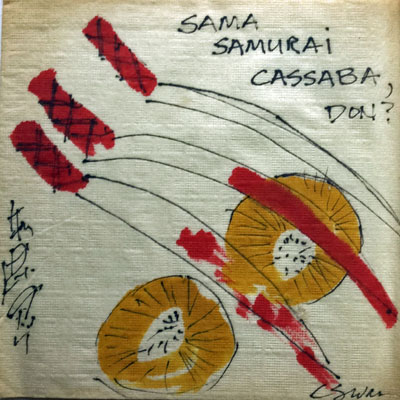
Sea Gull Cellar Bar Napkin Art, L. Swan artist
“I must create a System, – or be enslaved by another Man’s; I will not Reason or Compare, my business is to Create.” William Blake
Though written roughly 2500 years ago, Lao Tzu’s advice is timeless. With the prodding of my [friend], I was reminded of The Story of the Chinese Farmer (see link below) that Alan Watts used to illustrate Verse 58 of the Tao Te Ching, a verse he calls the Tao of Gain and Loss. My understanding of this story is that we often need to take a step back and relax. Whenever we experience a great gain or a great loss, or neither, Lao Tzu reminds us that things are not always what they seem. Life is constant change.
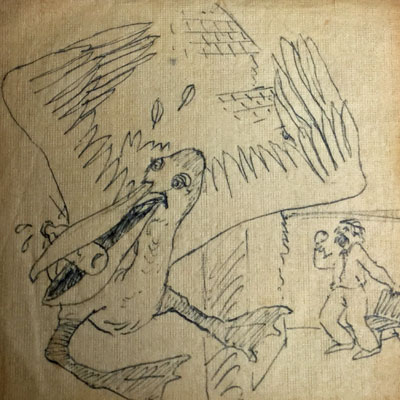
Sea Gull Cellar Bar Napkin Art, artist unknown
“Peeple of zee wurl, relax!” Sailor, the parrot, from Tom Robbins, Fierce Invalids Home from Hot Climates
“Lao-Tzu lived during a chaotic period of China’s history. Several powerful kingdoms were vying for the power to establish an Empire. Great armies were being raised on all sides and the wealth than had been spread throughout ninety percent of the population who lived in rural villages was being siphoned into the urban areas where it was concentrated in the hands of a very few. Loyalty, civic duty, and patriotism were the watchwords of the day. Expressions of dissatisfaction were viewed with suspicion. It was in this context that the teachings of Lao-Tzu’s Taoist philosophy were formed.”
Alan Watts’ version of The Story of the Chinese Farmer can be viewed in this beautiful video:
This video is narrated by Alan Watts and produced and animated by Steve Agnos. For more from Steve Agnos visit https://vimeo.com/steveagnos or https://vimeo.com/thesustainableman
The Story of the Chinese Farmer was stated in simple terms by author Kurt Vonnegut: “The truth is, we know so little about life, we don’t really know what the good news is and what the bad news is.”
Verse 58 translated by Gia-Fu Feng and Jane English
When the country is ruled with a light hand
The people are simple.
When the country is ruled with severity,
The people are cunning.
Happiness is rooted in misery.
Misery lurks beneath happiness.
Who knows what the future holds?
There is no honesty.
Honesty becomes dishonest.
Goodness becomes witchcraft.
Man’s bewitchment lasts for a long time.
Therefore the sage is sharp but not cutting,
Pointed but not piercing,
Straightforward but not unrestrained.
Brilliant but not blinding.
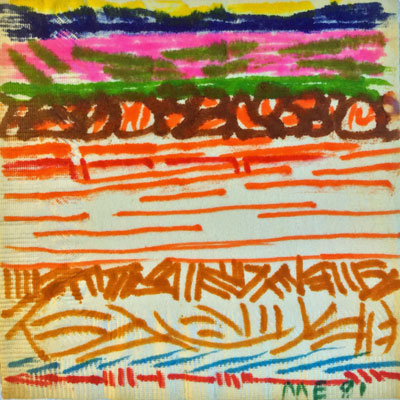
Sea Gull Cellar Bar Napkin Art, Mike Evans artist
There are numerous translations of the Tao Te Ching. Many can be found online HERE. One of my favorites is a very poetic version by the poet Witter Bynner (1944). More recently the author Ursula Le Guin published her excellent version with notes based on years of study (2011).
Maria Popova at Brain Pickings wrote this on Ursula Le Guin’s translation: A Small Dark Light: Ursula K. Le Guin on the Legacy of the Tao Te Ching and What It Continues to Teach Us About Personal and Political Power 2,500 Years Later.
Watching the video, reading and reflecting on Lao Tzu—this was positive. While I find much in Lao Tzu to admire, more than in many other “sacred” texts, there is one fatal defect in religious teachings—the interpretations vary with the reader. Philosopher Walter Kaufmann points this out in his essay/book The Faith of a Heretic:
“To an even moderately sophisticated and well-read person it should come as no surprise that any religion at all has its hidden as well as its obvious beauties and is capable of profound and impressive interpretations. What is deeply objectionable about most of these interpretations is that they allow the believer to say “Yes” while evading any “No”.
The Tao Te Ching can be calming and exasperating at the same time. I’m reminded of a line from a book on statistics I read long ago: “Any good statistician can take any set of statistics and make them say anything he wants.”
Like the proverbial but unanswerable question “What would Jesus Do?” Lao Tzu’s politics, like beauty, is in the eye of the beholder. Libertarians, socialists, pacifists, and even the enigmatic Donald Trump all find passages they think bolster their personal views.
Donald Trump cited Lao Tzu in one of his tweets:
“Mastering others is strength. Mastering yourself is true power.” – Lao Tzu
Donald Trump Tweet
12 PM – 27 June 2013
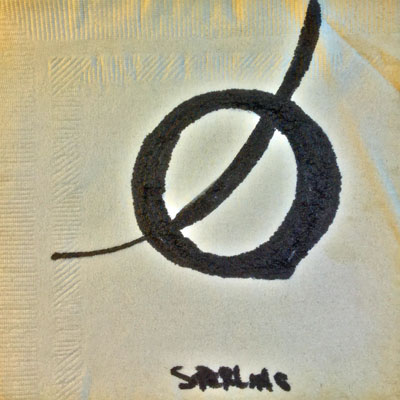
Sea Gull Cellar Bar Napkin Art, artist unknown
How I wish our president had worked harder on this key piece of advice from Lao Tzu!
There are many chapters to please libertarians:
Verse 74: Keeping Taxes Low
People starve
If taxes eat their grain,
And the faults of starving people
Are the fault of their rulers.
That is why people rebel.
Men who have to fight for their living
And are not afraid to die for it
Are higher men than those who, stationed high,
Are too fat to dare to die.
Verse 17: Limited Government is Best
A leader is best when people barely know that he exists, not so good when people obey and acclaim him, worst when they despise him. “Fail to honor people, they fail to honor you;” but of a good leader, who talks little, when his work is done, his aim is fulfilled, they will all say, “We did this ourselves.”
Verse 80: Isolationism
If a land is small and its people are few,
With tenfold enough to have and to do,
And if no one has schooled them to waste supply
In the country for which they live and would die,
Then not a boat, not a cart
Tempts this people to depart,
Not a dagger, not a bow
Has to be drawn or bent for show,
People reckon by knots in a cord,
Relish plain food on the board,
Simple clothing suits them well,
And they remain content to dwell
In homes their customs can afford.
Though so close to their own town another town grow
They can hear its dogs bark and its roosters crow,
Yet glad of life in the village they know,
Where else in the world shall they need to go?

Sea Gull Cellar Bar, Goslyn artist
Socialists could easily counter with other key passages they might prefer:
Chapter 77: To Each According to His Need
Is not existence
Like a drawn bow?
The ends approach,
The height shortens, the narrowness widens.
True living would take from those with too much
Enough for those with too little,
Whereas man exacts from those with too little
Still more for those with too much.
Now what man shall have wealth enough to share with all men
Save one who can freely draw from the common means?
A sane man needs no better support, no richer reward,
Than this common means,
Through which he is all men’s equal.
Chapter 53: Greed is Bad
If I had any learning
Of a highway wide and fit,
Would I lose it at each turning?
Yet look at people spurning
Natural use of it!
See how fine the palaces
And see how poor the farms,
How bare the peasants’ granaries
While gentry wear embroideries
Hiding sharpened arms,
And the more they have the more they seize,
How can there be such men as these
Who never hunger, never thirst,
Yet eat and drink until they burst!
There are other brigands, but these are the worst
Of all the highway’s harms.

Sea Gull Cellar Bar Napkin Art, Goslyn artist
Pacifists and those who believe in modesty and humility are praised by Lao Tzu while self-promotion is criticized:
Verse 24: Proportion
You can’t keep standing on tiptoe
or walk in leaps and bounds.
You can’t shine by showing off
or get ahead by pushing.
Self-satisfied people do no good,
self-promoters never grow up.
Such stuff is to the Tao
as garbage is to food
or a tumor to the body,
hateful.
The follower of the Way
avoids it.
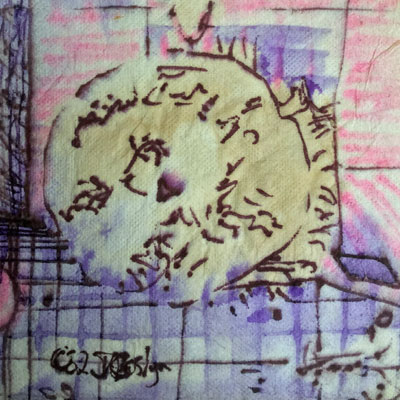
Sea Gull Cellar Bar Napkin Art, Goslyn artist
When it comes to Lao Tzu’s politics, I agree with William Martin who writes the Taoist Living Blog at www.taoistliving.com:
“So my honest answer is that I believe that he would long ago have left this society behind and the question of how he would vote would never arise. He would consider the country ungovernable and would ignore the empty rituals that perpetuate and legitimatize the privilege and power of the few. He did believe he had a civic duty and he fulfilled it through his teaching and through his life. His advice to us today would be the same advice he wrote to the Chinese people before he disappeared “into the West” twenty-five hundred years ago: the 81 poems of the Tao Te Ching.”
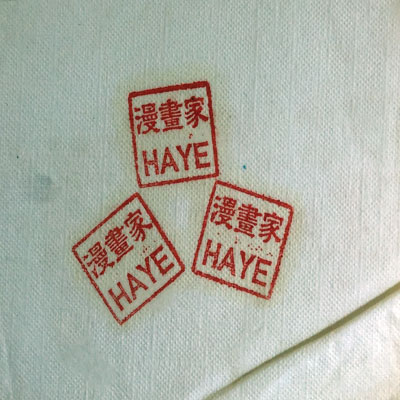
Sea Gull Cellar Bar Napkin Art, Jack Haye artist
Personally, I find Lao Tzu’s counterintuitive philosophy of “wu wei”—doing by not doing, action through inaction—a useful approach in my personal life but not always useful in the public arena of modern democracy. Long ago I chose to live in a small town and to live an ordinary life partially because of Lao Tzu’s precepts. I think I’m happier and healthier as a result. Remembering some of Lao Tzu’s most important passages helped me see the errors of my kvetching to friends and acquaintances.
However, to get elected, to impact the world and to protect democratic freedoms, people need to know you exist and how you think. A certain charisma is required. Charismatic people have a talent for getting other people to notice them. There’s nothing wrong with charisma when it’s tempered with humility. Walter Kaufmann calls ambition tempered by humility “humbition.” He makes it one of his four cardinal virtues.
Lao Tzu does not ask us to “turn on, tune in, drop out” in the words of Timothy Leary, words he borrowed from Marshall McLuhan. Leary himself explained what he meant by this in his 1983 autobiography Flashbacks and how he had been misinterpreted.
“Turn on” meant go within to activate your neural and genetic equipment. Become sensitive to the many and various levels of consciousness and the specific triggers that engage them. Drugs were one way to accomplish this end. “Tune in” meant interact harmoniously with the world around you – externalize, materialize, express your new internal perspectives. “Drop out” suggested an active, selective, graceful process of detachment from involuntary or unconscious commitments. “Drop Out” meant self-reliance, a discovery of one’s singularity, a commitment to mobility, choice, and change. Unhappily my explanations of this sequence of personal development were often misinterpreted to mean “Get stoned and abandon all constructive activity”.
Lao Tzu would not have made a politician. For better or worse politicians are required in a democracy. “Calm down, shut up.” This is advice Donald Trump gave and still gives to members of his own party as well as the press. No doubt Lao Tzu would have agreed with the wording but not with the way it was delivered or the meaning of the speaker.
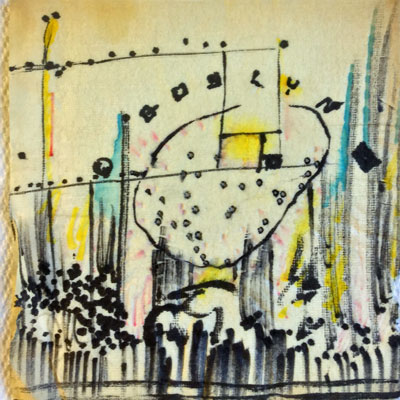
Sea Gull Cellar Bar Napkin Art, Goslyn artist
Verse 5 translated by Witter Bynner
Nature, immune as to a sacrifice of straw dogs,
Faces the decay of its fruits.
A sound man, immune as to a sacrifice of straw dogs,
Faces the passing of human generations.
The universe, like a bellows,
Is always emptying, always full:
The more it yields, the more it holds.
Men came to their wit’s end arguing about it
And had better meet it at the marrow.
The universe doesn’t care. It is not humane. It is silent. But, people, some people, do care. Walter Kaufmann’s humbition was mix of humility and ambition because he thought humility without ambition was an abrogation of personal responsibility.
“Humility is so much easier than honesty because it is compatible with sloth.”
Walter Kaufmann
The mystical poet William Blake says this in his Proverbs from Hell (a part of his book called The Marriage of Heaven and Hell)”:
“Prudence is a rich, ugly old maid courted by incapacity.”
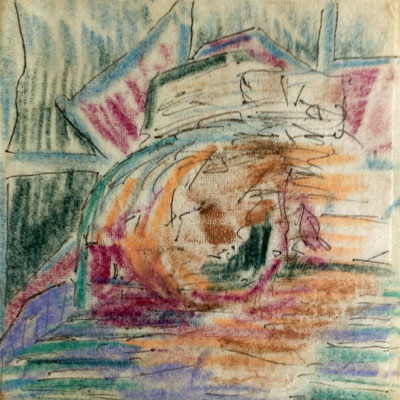
Sea Gull Cellar Bar Napkin Art, Goslyn artist
I agree with Blake. It’s not clear whether Lao Tzu and Blake would agree. They certainly would not agree on everything. But, I find consolation and wisdom in both. You can follow up on this idea in an excellent essay by Santi Tafarella: The Tao of Emily, the Calm of Lao Tzu, and Trouble from Blake.
Verse 38: Talking About Power
Great power, not clinging
to power,
has true power.
Lesser power, clinging to
power,
lacks true power.
Great power, doing
nothing,
has nothing to do.
Lesser power, doing
nothing,
has an end in view.
The good the truly good do
has no end in view.
The right the very
righteous do
has an end in view.
And those who act in true
obedience to law
roll up their sleeves
and make the disobedient
obey.
So: when we lose the Way
we find power;
losing power we find
goodness;
losing goodness we find
righteousness;
losing righteousness we’re
left with obedience.
Obedience to law is the dry
Husk
of loyalty and good faith.
Opinion is the barren
flower of the Way,
the beginning of ignorance.
So great-minded people
abide in the kernel not the
husk,
in the fruit not the flower,
letting one go, keeping
the other.
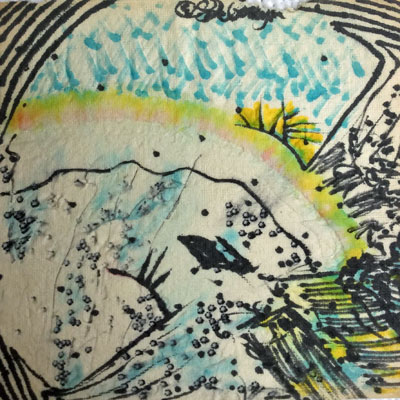
Sea Gull Cellar Bar Napkin Art, Goslyn Artist
It would seem impossible to reconcile a horror like the Holocaust with a perfect universe. The world is burning, but we are all part of something bigger? That just doesn’t feel right. Even Leonard Cohen, a poet known for his interest in the Tao and Buddhism, could not ignore the blood rush when faced with a real crisis. He was asked why he joined the IDF during the 1973 Israeli war and with a wide grin replied: “I had to get out of the house”. Yes, he liked to joke around, but it was much more complicated than that.
I’ve gone on much too long here. There is so much more to say. I’ll save it for later.
The important point for now is that I’ve emerged out of the dark woods. I’m learning again how to think about my angst with different and better tools, the tools of Lao Tzu and William Blake, and others. It might seem like a crazy thought to bring such different views together. But, why not? Two hammers would be a waste. A hammer and a saw make a better combination.
I’ll give both Blake and Lao Tzu a few last words, Blake because my passion remains hot and Blake stokes the fire in a way that feels appropriate today. Lao Tzu because I’ve been thinking a lot about him during what feels like a political crisis, how he must have felt as he crossed the great wall of China on the back of his water buffalo, and how I would feel if I did the same.
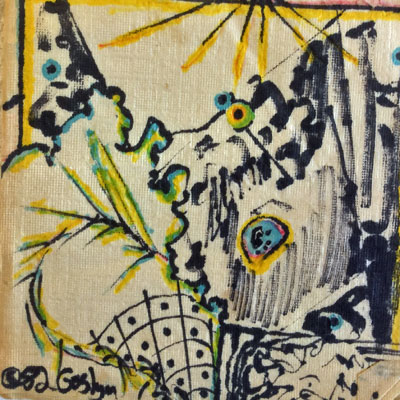
Sea Gull Cellar Bar Napkin Art, Goslyn Artist
Jerusalem
by William Blake
AND did those feet in ancient time
Walk upon England’s mountains green?
And was the holy Lamb of God
On England’s pleasant pastures seen?
And did the Countenance Divine
Shine forth upon our clouded hills?
And was Jerusalem builded here
Among these dark Satanic Mills?
Bring me my bow of burning gold!
Bring me my arrows of desire!
Bring me my spear! O clouds, unfold!
Bring me my chariot of fire!
I will not cease from mental fight,
Nor shall my sword sleep in my hand,
Till we have built Jerusalem
In England’s green and pleasant land.
Lao Tzu’s Verse 29 translated by Witter Bynner
Those who would take over the earth
And shape it to their will
Never, I notice, succeed.
The earth is like a vessel so sacred
That at the mere approach of the profane
It is marred
And when they reach out their fingers it is gone.
For a time in the world some force themselves ahead
And some are left behind,
For a time in the world some make a great noise
And some are held silent,
For a time in the world some are puffed fat
And some are kept hungry,
For a time in the world some push aboard
And some are tipped out:
At no time in the world will a man who is sane
Over-reach himself,
Over-spend himself,
Over-rate himself.
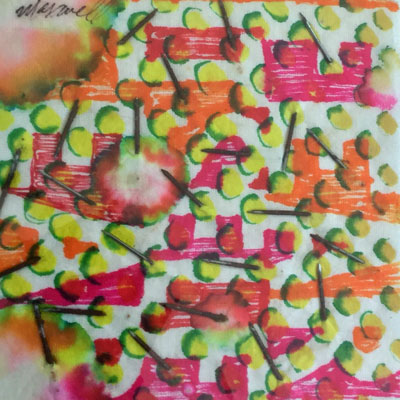
Sea Gull Cellar Bar Napkin Art, James Maxwell artist

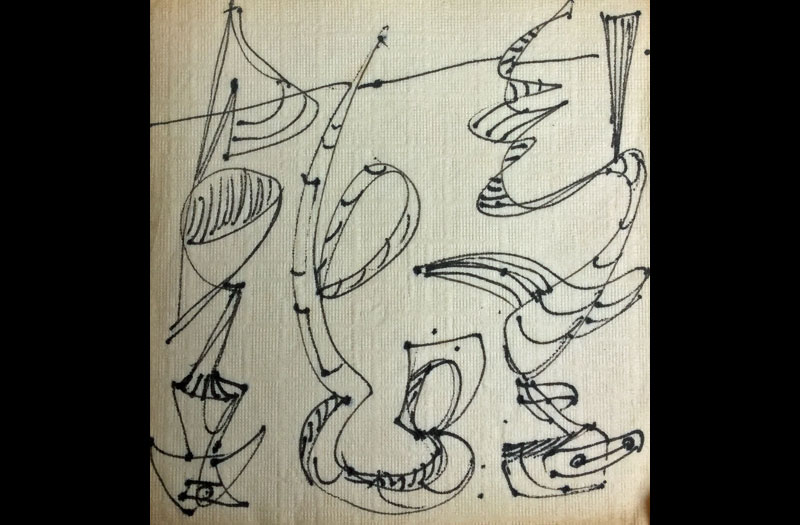
I found the Activist’s Tao Te Ching , Ancient Advice for a Modern Revolution, by William Martin at our local Gallery bookstore. I think you’ll like it. Easy to open
any time and read…nice “presentation”, centering, clear and kind. And author “lives with his wife in the hills of Northern California….www.taoistliving.com
Thanks Catherine, I’ll look into it. I like his website. Lots more to say but I had to cut it off at some point.
Hi Dave….I agree we have to keep a level head and keep our center right now. However, everyday I watch in HORROR what this idiot does…..
I have NEVER been so terrified over what I see coming out of the Whitehouse. There is such stupidity and ignorance. FEAR mongering….White Nationalism….Isolation…sounds wonderful……
You are right. This is no time to let our guards down.
Good stuff, David. Wish 45 could read and, if he could, that he’d glance at Lao Tzu. My favorite: You can’t shine by showing off or get ahead by pushing. Self-satisfied people do no good, self-promoters never grow up.
And this: At no time in the world will a man who is sane
Over-reach himself,
Over-spend himself,
Over-rate himself.